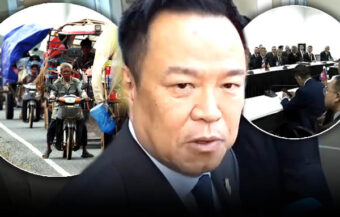Bank of Thailand senior director Ms Chayawadee Chai-Anant pointed towards a relaxation of public health curbs and rising government stimulus to prop up the economy as positive news but also warned that the Thai baht is likely to be volatile and to depreciate further in the current environment.
Thailand is being forced to resort increasingly to government stimulus measures as the kingdom’s economic prospects dived significantly in the third quarter of the year. This week, JP Morgan predicted a recovery in the fourth quarter but from manufacturing output to exports and incoming foreign tourism, there is deep uncertainty and a strong possibility that the country could see another year of GDP contraction despite the Bank of Thailand, at a Monetary Policy Committee meeting, holding tight to a projected 0.7% gain for the year following last year’s 6.1% contraction.

The Thai government has recently lifted its legally imposed borrowing limit of 60% of GDP to 70% with plans to boost public expenditure immediately and into next year to stimulate the economy.
Ms Patricia Mongkhonvanit of the Public Debt Management Office, this week, told the media that the government plans to borrow ฿2.3 trillion in the coming fiscal year and that government bonds will account for between 48% and 56% of this amount.
Change from last year’s use of short term financial instruments to long term government bonds
This would be up from 31% last year when the government relied more on short-term instruments such as promissory notes and treasury bills.
‘It’s time for us to mitigate the risks from heavily issuing short-term instruments in the previous year,’ Ms Patricia disclosed on Friday. ‘We plan to issue more long-term bonds to meet investor’s demand.’
The Thai government is counting on a boost in stimulus spending to give a jolt to domestic demand in the last quarter of the year in an effort to avoid what could still turn out to be a second year of GDP contraction.
Monetary Policy Committee meeting reduced a predicted gain in domestic consumption in 2021 from 2.5% to zero as household income declined sharply
It comes following a Monetary Policy Committee meeting of the Bank of Thailand last week which voted, in a unanimous decision, to keep interest rates on hold at an already record low of 0.5%.
The committee, however, decided to reduce the projected growth in domestic consumption this year from 2.5% to zero.
There are indications of a severe contraction in the economy in the third quarter with problems and uncertainty on all fronts going into the final quarter of the year which government planners are hoping will turn around Thailand’s economic fortunes.
This hope looks increasingly tenuous.
70% of Thai households have lost 40% of their income revealed a tourism survey this week
A survey by the Tourism Council of Thailand this week showed that over 70% of Thai households had lost 40% of their income during this pandemic.
Consumers have become wary given the incoherence seen this year in the government’s efforts to refloat the Thai economy.
Tourism chief again plans to open up Thailand’s rock bottom tourism industry to cryptocurrencies
The Bank of Thailand, this week, predicted that the government’s deficit for the year ended 30th September 2021 would be $15.3 billion, up from $1.5 billion, as the Finance Ministry moves to loosen the purse strings in response to what still is a deteriorating situation.
The Thai baht has lost 12.5% of its value so far in 2021 and a senior director at the bank said this week that the currency will remain volatile and could depreciate further.
Manufacturing in August fell by 18.6%, 3.2% for the month despite a lower than expected rise in exports
It comes as August showed a lower than expected increase in exports and the country’s manufacturing output for the month slipping back, led by a dramatic fall in output in respect of the automobile sector following a trend that began in July caused by a global shortage of computer chips.
According to JP Morgan in Singapore, in a note this week, the manufacturing index in Thailand contracted 3.2% month on month and 18.6% year on year even though last year’s base was already weak.
The bank expected the situation to improve in September with a lift in the final quarter. It is also pointed towards an improvement in the tech sector.
Thailand’s Industry Minister Suriya Jungrungreangkit highlighted an overall rise in the first eight months of the year in the manufacturing index driven by an improved export performance attributed to a global recovery.
However, Bank of Thailand executives were more circumspect.
High level of uncertainty surrounds the economy at the moment emphasises top central bank official
Mr Titanun Mallikamas, the Secretary-general of the Monetary Policy Committee laid emphasis on the high level of uncertainty surrounding the Thai economy right now including both internal and external factors while briefing the media after this week’s meeting.
In the meantime, JP Morgan is projecting that Thailand’s economy contracted 5% in the third quarter but suggested that a 4% gain in the fourth quarter was possible.
Last week, the central bank committee kept in place projected GDP growth of 0.7% for Thailand in 2021 as it slashed its projection for foreign tourists for the year from 700,000 down to 200,000.
Surprise September dip in China’s fortunes
At the same time, there are growing concerns about the impact of severe flooding this year in Thailand and disturbing reports of a sudden drop in manufacturing output in the Chinese economy for September reaching a 19-month low.
The situation was emphasised by Mr Zhang Zhiwei, a senior economist with Pinpoint Asset Management when he said: ‘The weak PMI will send an alarm to the government.’
On Wednesday, Bank of Thailand Director, Ms Chayawadee Chai-Anant told a press conference that while Thailand’s easing of public health measures would act as a boost to domestic consumption and overall economic activity, there were concerns in relation to manufacturing supply chains that would need to be closely monitored.
Thai industry well prepared for the severe flooding which hit the kingdom in recent weeks says banker
It is thought the government’s ‘bubble and seal’ measures for large factories in Thailand in July and August have helped to preserve manufacturing output although it still fell significantly.
Ms Chayawadee also suggested that industry in Thailand has already prepared well for flooding situations.
Baht will be volatile, likely to depreciate
In relation to the Thai baht, she warned that it was impacted by a range of factors including a rising current account deficit for the kingdom and decisions by other central banks.
‘Given various factors, the baht is likely to remain highly volatile and depreciate quickly,’ she explained. ‘But the Bank of Thailand has taken action periodically to prevent it from being too volatile and moving too rapidly that it affects the adjustment of the real sector. It is still closely monitored.’
Join the Thai News forum, follow Thai Examiner on Facebook here
Receive all our stories as they come out on Telegram here
Follow Thai Examiner here
Further reading:
Government borrows more to bring the economy through an extended Covid 19 crisis with GDP flat
Officials switch to prioritising economic recovery as CCSA expected to agree a new Covid approach
Rising prospect of GDP contraction for 2021 may see government breach the legal public debt limit
Economic fears rising as Thailand faces a bigger crisis than 1997 with rising job losses and debt
Baht falling with confidence in Thailand waning as foreign tourism closure and virus drive funds out
Central bank to lower GDP growth forecast as its attention turns to private sector debt management
Loan bill passes but Thai economic prospects are not bright with a 1.8% 2021 GDP gain predicted
IMF urges government to loosen nation’s purse strings as finances tighten with the tax take down
Failure to pass the ฿500 billion borrowing decree could lead to the dissolution of parliament
Industry leaders and central bank all warn that foreign tourism must return to avoid a collapse
Fact – only 6,556 visitors arrived in Thailand last month compared to 3.95 million in December 2019
Desperate foreign tourism business concerns are clinging to straws as they try to survive the crisis
Challenge of the virus and closure to tourism leads to major long term changes in the Thai economy
Finance Minister says economy must pivot away from tourism with a switch to S-Curve industries
Strengthening baht predicted as investors bet on a reopening of Thailand to mass tourism in 2021
Thailand facing a credit crunch as 3rd virus wave craters the kingdom’s economic recovery plans
3rd virus wave now spells not just economic loss but financial danger as kingdom’s debt level rises
Still time to avoid lockdown says Health Minister as 3rd virus wave dwarfs all infections to date
Thai economy is still in reverse despite rising confidence and a virus threatening a 3rd wave
Reopening of Phuket still not officially approved although it is the ideal test for a broader move
Minister urged not to be afraid to borrow in 2021 as fears grow for a quick foreign tourism revival
Economy to rebound as the year progresses driven by exports and a return of mass foreign tourism
Door closing on quick foreign tourism return as economic recovery is delayed to the end of 2022
Fact – only 6,556 visitors arrived in Thailand last month compared to 3.95 million in December 2019
Desperate foreign tourism business concerns are clinging to straws as they try to survive the crisis
Finance Minister says economy must pivot away from tourism with a switch to S-Curve industries


















